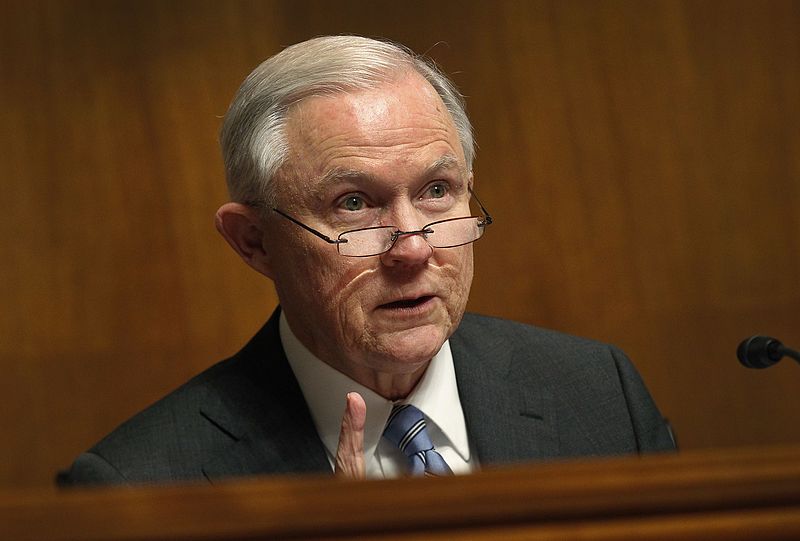by Michael Cooper, MadisonJay Solutions
 In recent days, and for the second time in 2018, the state-legal cannabis industry is abuzz over a new memo issued by Attorney General Sessions. Having revoked the Cole Memo in a January memo, the Attorney General’s latest memo addresses the use of capital punishment in drug cases. Notably, he urges federal prosecutors to consider the death penalty in drug cases—including in circumstances that facially could include the operation of large-scale state-legal marijuana businesses regardless of compliance with local rules.
In recent days, and for the second time in 2018, the state-legal cannabis industry is abuzz over a new memo issued by Attorney General Sessions. Having revoked the Cole Memo in a January memo, the Attorney General’s latest memo addresses the use of capital punishment in drug cases. Notably, he urges federal prosecutors to consider the death penalty in drug cases—including in circumstances that facially could include the operation of large-scale state-legal marijuana businesses regardless of compliance with local rules.
There’s no doubt “Sessions to Execute Legal Industry Members” makes for an eye-catching headline, but it’s time to pour some cold water on the hype: It’s highly unlikely that federal prosecutors would ever bring such a death penalty case. And even if prosecutors brought such a case, it’s even more unlikely that they could convince a jury to impose a death sentence that would stand up on appeal.
Given the fervor over this news, it’s worth explaining why the death penalty shouldn’t be keeping rule-following business owners up at night. But stepping back from the sensationalized headlines, it’s also worth considering what the real takeaway from the memo should be.
First, the prospect of a federal prosecutor seeking the death penalty against an individual for conduct she committed pursuant to a state-issued license and in conformance with a state-promulgated regulatory system are exceptionally low. Ask anyone who has actually interacted with federal prosecutors (and not just seen Goodfellas or American Hustle): Federal prosecutors are, unfailingly, exceptionally dedicated public servants who care above all about wielding their powers fairly and judiciously and getting the result right. They want to prevent serious crimes and put away threats to public safety. The idea that they would seek the death penalty against the owner of a state-licensed marijuana business operating in strict compliance with those rules is farfetched. After all, by their very conduct those individuals are demonstrating their ability to abide by the rule of law.
Certainly, Attorney General Sessions is not a fan of the state-legal marijuana industries. But it is an incredible leap to believe that he intends to have prosecutors seek the death penalty in such cases. As the memo says, the Attorney General “encourage[s]” prosecutors to seek the death penalty “when appropriate.” There has been no indication to date that Attorney General Sessions or any other federal prosecutor believe the death penalty is “appropriate” for a rule-following licensed cultivator in Colorado or retailer in Nevada.
 Second, even assuming a hypothetical prosecutor brought such a case and secured a conviction for the underlying offense, they would still have significant constitutional hurdles. As an initial matter, under the Sixth Amendment, those prosecutors would need to convince a jury in the state where the conduct occurred (and is licensed) that sufficient aggravating factors existed to impose the death penalty. Without getting too deeply into the legal weeds, the U.S. Supreme Court reiterated in 2016’s Hurst v. Florida that before a defendant can be sentenced to death, he has “right to have a jury find the facts behind his punishment.” Convincing a jury of the defendant’s peers in a state where the conduct is legal that the defendant’s conduct warrants the punishment of death would be a tall task for any prosecutor.
Second, even assuming a hypothetical prosecutor brought such a case and secured a conviction for the underlying offense, they would still have significant constitutional hurdles. As an initial matter, under the Sixth Amendment, those prosecutors would need to convince a jury in the state where the conduct occurred (and is licensed) that sufficient aggravating factors existed to impose the death penalty. Without getting too deeply into the legal weeds, the U.S. Supreme Court reiterated in 2016’s Hurst v. Florida that before a defendant can be sentenced to death, he has “right to have a jury find the facts behind his punishment.” Convincing a jury of the defendant’s peers in a state where the conduct is legal that the defendant’s conduct warrants the punishment of death would be a tall task for any prosecutor.
Moreover, even assuming prosecutors secured a death sentence from the jury, any defendant would immediately appeal asserting that such a punishment violates the Eighth Amendment’s prohibition on cruel and unusual punishment. As the Supreme Court reiterated in 2008’s Kennedy v. Louisiana, punishment for a crime must be graduated and proportionate to the offense under currently prevailing societal standards. That is a heavy burden for conduct that is licensed and regulated in the defendant’s home state. Particularly daunting for the prosecution is the fact that the proportionality inquiry includes consideration of which states permit execution for the offense. In this hypothetical case, the conduct in question is (1) not a capital offense in the defendant’s home jurisdiction, (2) not illegal in the defendant’s home jurisdiction, and (3) actually licensed and regulated by the defendant’s home jurisdiction.
So, if rule-abiding business owners shouldn’t spend sleepless nights waiting for a death penalty prosecution, what should they conclude from this memo? Foremost, they should recognize that their efforts to comply with state rules on marijuana are more essential than ever.
The Attorney General’s memo makes plain that federal prosecutors will aggressively pursue drug crimes. To the extent that a state-licensed business appears to those prosecutors to be violating local law and diverting marijuana to the criminal market or selling to minors, that is a prime target for aggressive enforcement. Savvy licensees are already building robust compliance programs to avoid providing any appearance that they are not in strict compliance with local rules. In a federal enforcement environment in which the Attorney General is encouraging prosecutions with a clear intent to deter bad actors in the future, those efforts become even more essential.
In short, the prospect of a death penalty prosecution of the owner of a rule-following, state-licensed marijuana business is very remote. The way to keep it very remote is to focus on efforts that demonstrate that you are, in fact, following the rules.
 Michael Cooper is the co-founder and managing member of MadisonJay Solutions LLC, the leading regulatory advisor to adult-use cannabis companies. A graduate of Harvard College and Harvard Law School, he previously served as General Counsel of MHW, Ltd., a leading provider of compliance services in the beverage alcohol industry, and in the litigation department of Cravath, Swaine & Moore LLP, known as one of the nation’s premier law firms for nearly two centuries.
Michael Cooper is the co-founder and managing member of MadisonJay Solutions LLC, the leading regulatory advisor to adult-use cannabis companies. A graduate of Harvard College and Harvard Law School, he previously served as General Counsel of MHW, Ltd., a leading provider of compliance services in the beverage alcohol industry, and in the litigation department of Cravath, Swaine & Moore LLP, known as one of the nation’s premier law firms for nearly two centuries.
Mr. Cooper can be reached at mcooper@madisonjaysolutions.com. Learn more at https://www.madisonjaysolutions.com


Follow NCIA
Newsletter
Facebook
Twitter
LinkedIn
Instagram
–